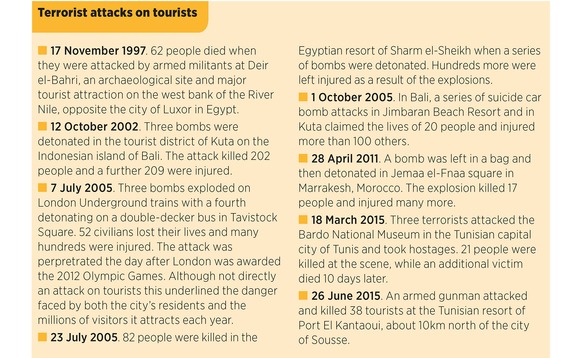
Travel Terrorism: Tourism under attack

Travellers want clarity and certainty when it comes to terrorism cover.
Terrorists often wage their war on tourists and the fate of the 224 passengers on flight KGL9268 appears to be another example of bystanders becoming victims in an ideological battle they never asked to fight.
On 31 October, the Russian airliner crashed in Egypt’s Sinai Peninsula as it made its way from the Red Sea resort of Sharm el-Sheikh to St Petersburg. The UK and US governments have suggested the most likely reason for the crash was an onboard bomb although, at the time of writing, there had been no formal confirmation of the cause.
If the event does turn out to be a terrorist incident then it will become the latest in a list of attacks perpetrated against tourists. For those personally affected by such attacks the cost is often immeasurable – and nothing will compensate them for the loss of loved ones or truly alleviate the impact of life-changing injuries.
But as these attacks become more frequent it is essential for the insurance market to be very clear about the cover it offers travellers in the face of a terrorist event and for customers to factor this into their purchasing decision.
Customers are sometimes slow to examine the details of a policy at the time of purchase and consumer and industry bodies must try to change this behaviour and encourage buyers to scrutinise their insurance more carefully at the point of purchase.
But there is also more insurers could do to make their customers better understand what they are buying and to encourage them to consider the potential impact of a terrorist attack on their trip.
“Whenever anything happens in the news we will get an influx of people asking if they are covered,” says Rebecca Rutt, insurance desk leader at Money Saving Expert. “They are not being told by their insurer and they are coming to us because they are not really sure.”
This does not reflect well on the industry and its goal should be getting customers to approach carriers or brokers directly rather than going to third parties with questions about their policy. Addressing this issue effectively would be an easy win for insurers and would enable them to create closer relationships with their customers.
“Offering more information would show them as being transparent and quick to react,” says Rutt, “even if they did not contact people directly but had clear messaging on their website or social media.”
Terrorism exclusions
Another criticism often levelled at insurance companies is the standard exclusion clause that many travel insurance policies carry for terrorism. James Daley, managing director at Fairer Finance, comments: “In terms of a blanket terrorism exclusion, that is something insurers need to look at.”
He adds: “It is probably reasonable for them to exclude it in certain countries and certain parts of the world. But actually, if you are going to a western country, the chance of being involved in a terrorist attack is fairly slim and I do not understand why insurance companies think that is a reasonable exclusion.”
Daley also believes that insurers should make more effort to establish where customers are travelling to and take more time to explain exclusions where they exist. “If you are going off to a North African country, for example, a travel insurer could ascertain that beforehand or make it much clearer than they do at the moment that if you travel anywhere that the Foreign & Commonwealth Office advises against, then cover will not be available.”
For insurers, the challenge is to offer good value cover that meets the varied needs of travellers, while making them all aware of exactly how and when their policy will respond. In part, this means changing the purchase journey and Daley believes too much focus is put on getting the sale rather than educating the customer.
“If you go through an insurance purchase process online,” he says, “then what you end up with is all these disclaimers and dense bits of text with a tick box in them to agree to the conditions and then you are off to the credit card screen and you have bought the policy.”
One size does not fit all, warns Daley. He’d like insurers to slow down the online process. In his view, explaining how policies differ is crucial if customers are going to end up with a policy that is fit for purpose.
Varying levels of cover
The variety of terrorism cover also creates problems and Peter Hayman, director at specialist travel insurance broker PJ Hayman, explains: “Terrorism is often an absolute exclusion in travel insurance. Those policies that provide an element of cover will typically limit this to medical expenses occurring as a consequence of a terrorist incident while the consumer is travelling – for example, they are caught up in something unexpected. The personal accident section may also apply and, in some cases, loss or damage to personal effects.”
Hayman points out that some policies will provide additional expenses cover in the event of the FCO changing its advice about a destination if the consumer is travelling independently and not through a tour operator.
Carolyn Scott, head of household and lifestyle underwriting at Axa, accepts cover does not always respond fully to acts of terrorism and says: “While cover is restricted in our policies, we do provide emergency medical expenses, hospital benefit and personal accident in the event of a terrorist incident.”
Susan Stevenson, CEO at Cigna Insurance Services, agrees with Hayman and Scott about the different levels of cover in the market and says it remains essential for policyholders to carefully check that the cover they buy actually meets their needs. But she also raises the issue of wordings being interpreted in different ways. “The majority of companies provide cover relating to terrorist acts,” she says, “although this varies in the industry according to how strictly policies’ terms are interpreted.”
From a consumer point of view any variance in the interpretation of a policy’s terms and conditions simply creates confusion. Customers buy a policy and at the point of claim what they want is certainty, not a discussion about the merits of their claim or an analysis of why it might not be valid.
This, therefore, is an area where insurers could spend more time in making sure customers do not hold any misconceptions about cover they have bought. For example, insurers could make new information available on a monthly basis to address the most popular areas of contention from the previous month.
Surely it cannot be that difficult to monitor claims departments and then produce updated communications that are prominently displayed to new and existing customers to explain the most common sources of misunderstanding?
Insurers have already shown themselves capable of responding effectively to changing circumstances in the travel market, for instance, in relation to Greece and its ongoing financial troubles.
Rutt comments: “A lot of people came to us and were worried about going to Greece because of the limits on the cash machines. In that situation, insurers were all quite proactive as they all increased their cash allowance.”
Unfortunately, insurers have not been so willing or perhaps able to change things when it comes to how they deal with terrorism or to create a minimum threshold of cover that every policy must provide.
Insurers will argue that minimum levels of cover make it difficult for them to differentiate their policies and that some customers will end up paying for cover they do not need. However, consumer groups do not agree and Rutt says: “It would be really useful and it would give customers more protection.”
Constrained by reinsurance
Daley has raised the issue of relaxing the terrorism exclusions that exist on so many travel policies and, despite some carriers exploring possible changes, it seems their hands are tied.
“We are having conversations with insurers and a lot of them are thinking about trying to push back on their terms and change the cover around terrorism,” explains Daley. “I am always told it is the reinsurers that insist on it. They have quite a big influence on some of the key areas of cover and can be quite prescriptive with their insurer clients in terms of what they do and do not include in their documents.”
Until consensus is reached with reinsurers, it will be impossible to create a minimum standard level of terrorism cover on travel insurance policies and it will be difficult for individual insurers to design policies that are flexible enough to respond to changing customer concerns.
Cost impacts quality
But these are not the only problems facing insurers as they battle to provide cover at rates that remain stubbornly suppressed.
Hayman comments: “For 25 years I have been involved in travel insurance and I have seen prices today at less than they were 25 years ago. This takes no account of increased claims costs or medical inflation. Insurers on a cheap policy inevitably adopt a firm approach on claims, which has a knock-on effect in terms of reputation of the brand and travel insurance as a whole. We really do feel strongly that it is better to pay a fair price and have it backed by an insurer that can adopt a sensible and pragmatic approach to wording and subsequent claims.”
The insurance sector does a good job at providing cover for many of its customers, despite the financial pressures it is under and the difficulties it has in trying to extend the scope of cover it offers.
This good work is something the industry is very keen to promote. Stevenson says: “Last year, travel insurers paid out £370m in 581,000 claims by policyholders who needed help while abroad, according to the Association of British Insurers. That included 202,000 claims for medical treatment – equivalent to 3800 a week.”
But the industry also has to realise that the customers who have their claims turned down have the ability to damage reputations at both a company and an industry level.
Daley accepts that the insurance industry does a lot of good work, but he says: “It still messes up an awful lot as well. Those situations are going to play out a lot worse for them. Every one of those [turned down claims] causes 10 times more damage than the benefit they get from every claim they pay.”
On that basis, he believes the industry should focus on the areas that breed dissatisfaction instead of trumpeting about its successes.
Only users who have a paid subscription or are part of a corporate subscription are able to print or copy content.
To access these options, along with all other subscription benefits, please contact info@postonline.co.uk or view our subscription options here: http://subscriptions.postonline.co.uk/subscribe
You are currently unable to print this content. Please contact info@postonline.co.uk to find out more.
You are currently unable to copy this content. Please contact info@postonline.co.uk to find out more.
Copyright Infopro Digital Limited. All rights reserved.
You may share this content using our article tools. Printing this content is for the sole use of the Authorised User (named subscriber), as outlined in our terms and conditions - https://www.infopro-insight.com/terms-conditions/insight-subscriptions/
If you would like to purchase additional rights please email info@postonline.co.uk
Copyright Infopro Digital Limited. All rights reserved.
You may share this content using our article tools. Copying this content is for the sole use of the Authorised User (named subscriber), as outlined in our terms and conditions - https://www.infopro-insight.com/terms-conditions/insight-subscriptions/
If you would like to purchase additional rights please email info@postonline.co.uk








